
Addressing Co-occurring Disorders In Drug Addiction
Living with addiction is like being swept away in a river’s current – it feels nearly impossible to stop or change direction. The same rings true when a co-occurring disorder, like anxiety or depression, shares the stage. Yet, with strength and commitment, it is possible to navigate this turbulent river and make it to the shore.
As you’re living in South Africa, you already know how our society grapples with the reality of addiction and mental health. They are topics often swept under the rug, shrouded in stigma and bias. However, it’s time to step into the light and break down the barriers that hinder open discussion and understanding. As our African philosophy of Ubuntu teaches us, “I am because we are.” This philosophy promotes interconnectedness and empathy, concepts which we should apply to understanding addiction and mental health.
Co-occurring disorders, also known as dual diagnosis, are increasingly prevalent amongst individuals battling drug addiction. Addressing both the addiction and the accompanying mental health issue simultaneously can be daunting, yet it’s essential for a successful recovery. Viewing these challenges through the lens of eastern philosophy, one can see addiction and mental health as interconnected parts of the self, rather than separate issues.
Addressing Co-occurring Disorders in Drug Addiction
- Understanding Interconnectedness:
- View your struggle with addiction and mental health disorders as interconnected parts of your overall well-being, not isolated issues.
- This perspective helps tackle both disorders simultaneously, acknowledging their interplay.
- Integrated Treatment:
- This therapy focuses on treating both the addiction and the mental health disorder together.
- It offers a comprehensive plan that helps manage symptoms and regain balance in life.
Overcoming Stigma and Bias
- Cultivating Understanding and Acceptance:
- Educate yourself and others about addiction and mental health disorders.
- Dismantle misconceptions and become a beacon of empathy and understanding in your community.
- Applying Ubuntu Philosophy:
- Recognize that your well-being is intrinsically connected to the well-being of others.
- Foster an environment of mutual respect and understanding to dismantle societal prejudices.
- Embracing Sawubona:
- Truly “see” someone by acknowledging their struggles and their humanity.
- Promote dignity and eradicate stigma towards individuals with co-occurring disorders.
Community Connection
- Building a Support Network:
- Reach out to professionals for guidance and connect with others who share similar experiences.
- This network assists in managing co-occurring challenges and challenging stigma and bias related to addiction and mental health disorders.
Yin and Yang
Just as Taoism embraces harmony and balance, so should our approach to treating co-occurring disorders. The Yin and Yang concept teaches that seemingly opposing forces are interconnected and interdependent, providing a useful analogy for understanding the relationship between addiction and mental health disorders. When one is out of balance, the other is also affected. It’s not about treating addiction or mental health disorder, it’s about treating you, in your entirety.

There’s a strong need to destigmatize addiction and mental health disorders in our South African society. Discrimination and bias often stem from a lack of understanding, leading to a societal pressure that makes it difficult for individuals to seek help. Remember the essence of Ubuntu, the acknowledgement that your well-being is intrinsically tied to the well-being of others. When one of us suffers, we all suffer. It’s crucial to foster an environment where empathy and understanding replace judgement and bias.
Understanding and overcoming these challenges can feel like trying to comprehend the depth of the ocean, but always remember that even the longest and darkest night will end and the sun will rise. You are not alone and your struggle does not define you.
To further ponder on this topic, here are some thought-provoking questions:
- How can we, as a society, apply the principles of Ubuntu to break down the stigma associated with addiction and mental health?
- In what ways can the balance and harmony principles of eastern philosophies guide our approach to treating co-occurring disorders?
- How can we create safe and supportive environments for individuals dealing with these struggles to freely seek help?
- How can we alter societal narratives to emphasize that having a co-occurring disorder is not a sign of weakness but an aspect of the human experience?
- How can we better educate ourselves and others to understand that addiction and mental health disorders are not moral failings, but complex health issues?
- How might our society look if we replaced judgement and bias with empathy and understanding?
Frequently Asked Questions
Q1: How can I understand the concept of interconnectedness in the context of co-occurring disorders?
A1: Co-occurring disorders in addiction can be understood as interconnected in that they impact and influence each other. For instance, an untreated mental health disorder can exacerbate drug addiction, and vice versa. Rather than viewing these as separate, isolatable issues, they should be seen as parts of a complex, interwoven situation affecting your overall well-being.
Q2: What is the benefit of integrated treatment for co-occurring disorders?
A2: Integrated treatment for co-occurring disorders is beneficial as it acknowledges the impact that each disorder has on the other. Instead of treating them separately, integrated treatment addresses them concurrently, offering a comprehensive strategy that considers their mutual influence.
Q3: How can I contribute to overcoming the stigma and bias associated with addiction and mental health disorders?
A3: By educating yourself and others about these disorders, you can help to dismantle common misconceptions and foster understanding. Through empathy, understanding, and open communication, you can contribute to creating an environment where individuals with these disorders are respected and supported rather than stigmatized.
Q4: How can the philosophies of Ubuntu and Sawubona be applied to addiction and mental health disorders?
A4: The philosophy of Ubuntu recognizes the interconnectedness of all individuals. By applying this to addiction and mental health, you can help to foster a community that supports and empathizes with those struggling with these disorders. Sawubona, which means “I see you”, encourages acknowledging the struggles and humanity of others. By truly ‘seeing’ people with these disorders, you can help to eradicate stigma and promote dignity.
Q5:Why is building a support network important in managing co-occurring disorders?
A5: Building a support network provides a sense of community, reducing feelings of isolation often associated with these disorders. This network can offer emotional support, shared experiences, and practical advice. Furthermore, a supportive community can be a powerful force in challenging societal stigma and bias related to addiction and mental health disorders.
Addressing co-occurring disorders in drug addiction and overcoming societal stigma and bias is a multifaceted challenge that demands a comprehensive, interconnected response. Understanding the interconnected nature of addiction and mental health disorders, coupled with a commitment to integrated treatment, offers a path towards effective management of these challenges.
A profound transformation in societal perception and attitudes is equally crucial. Guided by the principles of Ubuntu and Sawubona, we can foster a society that not only understands these disorders but also acknowledges the humanity of those living with them. We can be beacons of empathy, understanding, and dignity, standing against the prevailing winds of stigma and bias.
Remember that you are not alone in this struggle. With the support of a caring community and guided by professionals, the challenge of co-occurring disorders becomes more navigable. Remember the power of connection, both in the fight against addiction and mental health disorders, and in the quest to reshape societal perceptions. This endeavor is not just about individual battles; it is a collective effort for a more empathetic, understanding, and supportive society.


